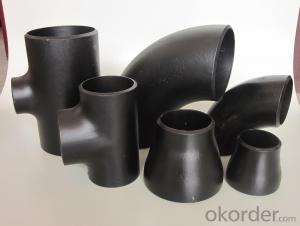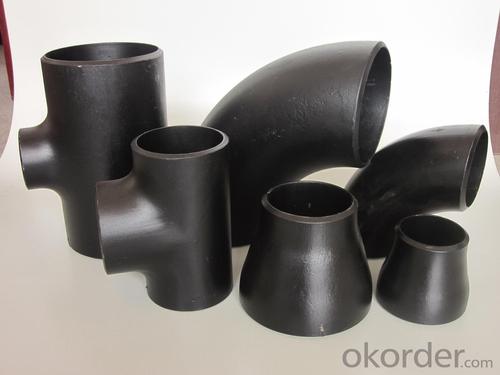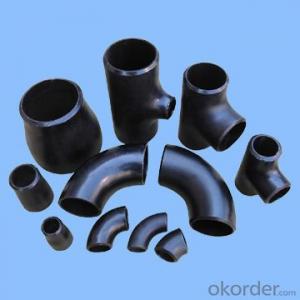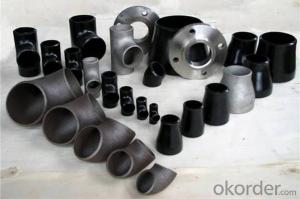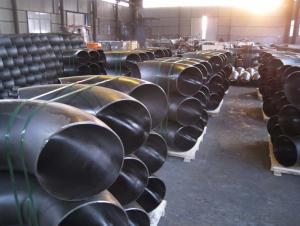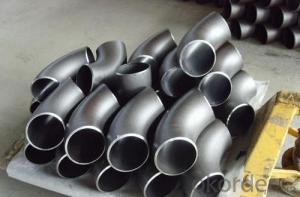CARBON STEEL PIPE FITTINGS ASTM A234 FLANGE 16'' 20'' 22''
- Loading Port:
- Tianjin
- Payment Terms:
- TT OR LC
- Min Order Qty:
- 1 m.t.
- Supply Capability:
- 30000 m.t./month
OKorder Service Pledge
OKorder Financial Service
You Might Also Like
Specifications
1.we produce seamless steel pipe
2.size:48-219*4.5-45mm
3.ISO 9000 approved
4.Market:south/east Asia,Mid-east,South America
seamless steel pipe
Material J55 K55 N80 L80 P110.etc
Standard ASTM JIS
Usage conveying oil gas ,oil pipe line,pipe material collar,oil nature gas,
Packing wooden cases or wooden pallet ,export standard package
Others:Special design available according to requirement
Anti-corrosion available and high temperature resistence
Delivery time 30days
Payment term T/T L/C
Name | API oil casing pipe | ||||
Out Diameter | Wall thickness | Material | Thread | Length | |
in | mm | ||||
5 1/2 | 139.7mm | 6.20 | J55/K55/N80 | LTC/STC/BTC | R2 |
6.98 | |||||
7.72 | |||||
9.17 | |||||
10.54 | |||||
6 5/8 | 168.28mm | 7.32 | J55/K55/N80 | LTC/STC/BTC | R2 |
8.94 | |||||
10.59 | |||||
12.06 | |||||
12.06 | |||||
8 5/8 | 219.08 | 8.94 | H40 | S/L/B | 9 5/8R2 |
J55/K55 | S/L/B | ||||
10.6 | L80 | L/B | |||
12.7 | L80 C95 | L/B | |||
14.15 | P110 | L/B | |||
9 5/8 | 244.48 | 13.84 | J55 K55 | R2 | |
15.11 | L80 | L/B | |||
10 3/4 | 273.05 | 11.43 | J55 K55 | S/B/E | R2 |
13.84 | P110 | S/B | |||
15.11 | P110 | S/B | |||
11 3/4 | 298.45 | 12.19 | J55 K55 | S/B | R2 |
10.96 | J55 K55 | S/B | |||
13 3/8 | 339.72 | 12.19 | J55 K55 L80 | S/B | R2 |
10.92 | J55 K55 | S/B | |||
13.06 | L80 | S/B | |||
Coupling and thread can be required according to customer requirment
- Q: What are the common uses of stainless steel pipes?
- Stainless steel pipes are widely used in various industries for a multitude of applications. Some of the common uses of stainless steel pipes include: 1. Plumbing and Water Supply: Stainless steel pipes are often used in residential, commercial, and industrial plumbing systems due to their corrosion resistance, durability, and ability to handle high-pressure applications. They are also used in water treatment plants and wastewater management systems. 2. Oil and Gas Industry: Stainless steel pipes are extensively used in the oil and gas industry for transporting oil, gas, and other fluids. They can withstand high temperatures, pressure, and corrosive environments, making them ideal for this industry. 3. Food and Beverage Industry: Stainless steel pipes are widely used in the food and beverage industry due to their hygienic properties and resistance to corrosion. They are commonly used for transporting liquids, gases, and food products in processing plants, breweries, wineries, dairies, and other food-related facilities. 4. Chemical and Petrochemical Industry: Stainless steel pipes are critical in the chemical and petrochemical industry, where they are used for transporting corrosive chemicals, acids, and other hazardous substances. The pipes' resistance to corrosion and high temperatures makes them suitable for these demanding applications. 5. Construction and Architecture: Stainless steel pipes are used in construction and architecture for various purposes such as structural support, handrails, guardrails, and decorative elements. Their strength, durability, and aesthetic appeal make them a popular choice in modern architectural designs. 6. Automotive and Transportation: Stainless steel pipes are used in the automotive industry for exhaust systems, fuel lines, and other components that require resistance to high temperatures and corrosion. They are also used in the transportation of fluids and gases in ships, trains, and airplanes. 7. Pharmaceutical Industry: The pharmaceutical industry requires high-quality materials that meet stringent sanitary standards. Stainless steel pipes are commonly used in pharmaceutical manufacturing processes for transporting liquids, gases, and chemicals due to their cleanability, corrosion resistance, and compatibility with pharmaceutical products. 8. Power Generation: Stainless steel pipes are used in power plants, both conventional and renewable, for various applications such as steam lines, condensers, and heat exchangers. They are chosen for their ability to withstand high temperatures, pressure, and corrosive environments. In summary, stainless steel pipes find applications in a wide range of industries including plumbing, oil and gas, food and beverage, chemical and petrochemical, construction, automotive, pharmaceutical, and power generation. Their corrosion resistance, durability, and ability to handle high temperatures and pressure make them a versatile and reliable choice for various industrial applications.
- Q: How are steel pipes used in airport infrastructure?
- Steel pipes are used in airport infrastructure for a variety of applications such as constructing hangars, fuel distribution systems, water supply networks, and underground utility lines. They provide structural support, durability, and resistance to extreme weather conditions, making them essential for the smooth functioning and long-term reliability of airport facilities.
- Q: How do steel pipes compare to other materials in terms of cost?
- Steel pipes are generally more cost-effective than many other materials used for pipes, thanks to their durability, strength, and availability. While initial costs may vary depending on factors like size and grade, steel pipes offer a longer lifespan and require less maintenance compared to other materials, making them a cost-efficient choice in the long run.
- Q: What's the difference between straight steel pipe and seamless steel pipe?
- Seamless steel pipe and welded pipe are separated because of different production process. Seamless steel tubes include hot rolling, cold rolling, cold drawing, and other rare, such as cold extrusion.
- Q: Is hot dipped plastic pipe steel?
- The characteristics of hot dipped plastic pipe are:1., hot dipped plastic pipe superior anti-static performance: through the formula to add antistatic agent, so that its internal and external surface resistance value reached and exceeded the national industry standards.2., such as the use of plastic raw materials, add flame retardants. The flame retardant performance index conforms to the national standard, and the steel plastic composite structure has better flame retardance than the pure plastic pipe material, and is suitable for underground inflammable, explosive and other places.3. hot dip coating steel strong adhesion: steel surface after special treatment, curing, coating adhesion is greater than or equal to 30N/10mm.4., dense internal and external resin layer: coating thickness of more than 0.5 mm, no pinholes, with excellent corrosion resistance.The mechanical properties of plastic steel pipe superior 5. hot dip: can withstand the harsh conditions of use: coating steel has good toughness, high mechanical strength, impact bending and other foreign influence, has a strong bearing capacity, has better performance than other mine plastic pipes.6. hot dip steel corrosion and fouling, the fluid resistance is small: corrosion and fouling, especially suitable for the underground conveying high sulfur water and transport of calcium and magnesium plasma water, save the maintenance cost, service life is much higher than that of the other pipe, high economic benefit.7. self lubrication: smooth wall, no fouling, small transmission resistance, under the same conditions, can improve the transport capacity of 30%.8. convenient and reliable connectionThe utility model completely overcomes the defects of the difficult connection of the pure plastic mining materials, and can be connected with the underground steel pipe and the valve by using flanges, fast couplings, etc., and has strong interchangeability.
- Q: Can steel pipes be used for wastewater treatment?
- Yes, steel pipes can be used for wastewater treatment. Steel pipes are commonly used in the construction of wastewater treatment plants and systems due to their durability, strength, and resistance to corrosion. They are especially suitable for transporting and distributing wastewater, as they can withstand high pressure and temperature variations. Steel pipes can also be coated or lined with materials that provide additional protection against corrosion and chemical reactions with the wastewater. However, it is important to ensure that the steel pipes are properly maintained, inspected, and replaced when necessary to prevent any potential leaks or failures that could compromise the wastewater treatment process.
- Q: Can steel pipes be used in high-pressure applications?
- Yes, steel pipes can be used in high-pressure applications. Steel pipes are known for their strength and durability, making them suitable for handling high pressures in various industries such as oil and gas, water distribution, and chemical processing.
- Q: What is the role of steel pipes in the transportation of water?
- Steel pipes play a crucial role in the transportation of water due to their durability and strength. They are widely used in various water supply systems, including municipal water distribution networks, irrigation systems, and industrial water transportation. One of the main advantages of steel pipes is their ability to withstand high pressure and provide a reliable conduit for the transportation of water over long distances. The strength of steel allows for the construction of pipelines with larger diameters, enabling the efficient movement of large volumes of water. Steel pipes are also highly resistant to corrosion, which is essential when transporting water that may contain various minerals, chemicals, or contaminants. The corrosion-resistant properties of steel pipes ensure the water quality remains uncompromised throughout the transportation process. Moreover, steel pipes offer excellent structural integrity, making them suitable for underground and above-ground installations. They can withstand extreme weather conditions, seismic activity, and heavy loads, ensuring the longevity and reliability of the water transportation system. In addition to their strength and durability, steel pipes are also easy to install and maintain. They can be welded together, allowing for a seamless pipeline with minimal leakage points. Regular inspections and maintenance can help identify any potential issues or damages, ensuring the uninterrupted flow of water. Overall, steel pipes play a vital role in the transportation of water by providing a robust and reliable conduit. Their ability to withstand high pressure, resist corrosion, and maintain water quality makes them an ideal choice for various water supply systems, contributing to the efficient and sustainable distribution of water resources.
- Q: How do steel pipes differ from other types of pipes?
- Steel pipes possess several distinct characteristics that set them apart from other pipe types. Primarily, their strength and durability are well-known. They exhibit remarkable resistance to heat, pressure, and corrosion, rendering them suitable for numerous applications. Additionally, their robustness allows them to bear heavy loads and offer an extended service life. One distinguishing feature of steel pipes lies in their versatility. They can be manufactured in various shapes and sizes to fulfill specific project requirements. This adaptability has contributed to their popularity across a diverse range of industries, including construction, oil and gas, water treatment, and manufacturing. Moreover, steel pipes exhibit exceptional thermal conductivity, facilitating efficient heat transfer between different areas. Consequently, they prove suitable for applications involving heating and cooling systems, as well as the transportation of hot fluids or gases. Furthermore, steel pipes are renowned for their resistance to fire. They possess a high melting point and are not easily ignited or conducive to the spread of flames. This characteristic is particularly critical in applications where fire safety is a concern, such as buildings or industrial facilities. Lastly, although steel pipes may entail a higher initial cost compared to other pipe types, their long-term benefits, such as durability and low maintenance requirements, often outweigh the initial investment. Additionally, steel pipes are highly recyclable, making them an environmentally friendly choice. In summary, steel pipes stand out due to their strength, durability, versatility, excellent thermal conductivity, fire resistance, and recyclability. These remarkable qualities establish steel pipes as the preferred option for a wide range of applications across various industries.
- Q: Can steel pipes be used for power plant construction?
- Yes, steel pipes can be used for power plant construction. Steel pipes are commonly used in power plants for various applications such as steam piping, water piping, and air/gas piping. They are preferred due to their strength, durability, and ability to withstand high temperatures and pressures. Steel pipes also have excellent corrosion resistance properties, which is crucial in power plant environments where different fluids and gases are transported. Additionally, steel pipes can be easily welded, allowing for efficient installation and maintenance. Overall, steel pipes are a reliable and cost-effective choice for power plant construction.
Send your message to us
CARBON STEEL PIPE FITTINGS ASTM A234 FLANGE 16'' 20'' 22''
- Loading Port:
- Tianjin
- Payment Terms:
- TT OR LC
- Min Order Qty:
- 1 m.t.
- Supply Capability:
- 30000 m.t./month
OKorder Service Pledge
OKorder Financial Service
Similar products
Hot products
Hot Searches
Related keywords
